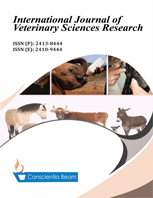Cholesterol Content of Bull Spermatozoa Alters Survival at Ultra-Low Temperatures
DOI:
https://doi.org/10.18488/journal.110/2015.1.3/110.3.63.69Abstract
Though cryopreservation bestows many advantages, it decreases tolerance to stress of temperature variations, reducing survival of spermatozoa to a great extent. A gradual reduction in cholesterol content of spermatozoa during cryopreservation was reported. Thus the objective of this investigation was to evaluate relationship of cholesterol content of spermatozoa with surviving ability, biochemical integrity of membrane and in vitro fertility (IVF) of spermatozoa following cryopreservation. From each ejaculate (n=12) aliquot was taken for evaluation of semen quality parameters and thereafter it was processed for cryopreservation. Cholesterol content, viability, motility and biochemical integrity of membrane (Hypo osmotic swelling, HOS response) of spermatozoa at fresh, pre-freeze and frozen-thaw stages and IVF parameters at frozen-thaw stage were evaluated. Values were fitted in prediction equation to predict cryosurvivability and biochemical integrity of spermatozoa membrane. Study indicated that cholesterol content of fresh spermatozoa can be used to predict viability at pre-freeze and frozen-thaw stages of cryopreservation protocol with medium level of accuracy (p<0.05). Cholesterol content of fresh, pre-freeze and frozen-thaw spermatozoa can be used to predict HOS response with medium level of accuracy (p<0.05) at respective and forthcoming stages. However cholesterol content of spermatozoa was not found to be significant predictor of individual motility and in vitro fertility (penetration percent and penetration index). This study revealed evidence that cholesterol content of fresh, pre-freeze as well as frozen-thaw bull spermatozoa can be a good predictor of viability and biochemical integrity of spermatozoa membrane following preservation at ultra-low temperature.

